Description
"Allegory of Love, III: Respect" is a masterpiece by the renowned Italian painter Paolo Veronese, created in the 16th century. Originally sized 186 x 194 cm, this painting offers a fascinating look at the subject of love and veneration.
Veronese's artistic style is evident in this work, with his trademark attention to detail and ability to capture beauty in every brushstroke. His mastery of color and light can be seen in the way he portrays the characters and elements of the scene. The use of warm and rich tones creates an atmosphere full of sensuality and mystery.
The composition of the painting is carefully planned, with each element strategically placed to tell a story. In the center of the work is a female figure, representing the virtue of respect. Her graceful posture and calm expression convey a sense of serenity and reverence. Around him, Veronese has arranged characters that represent different aspects of love, creating a complex and symbolic narrative.
Color plays a crucial role in "Allegory of Love, III: Respect." Gold and red tones dominate the scene, evoking passion and devotion. Veronese uses contrasts and nuances to create depth and realism, bringing to life each figure and object depicted in the painting.
The story behind this work is intriguing and little known to many. "Allegory of Love, III: Respect" is part of a series of paintings that Veronese created for the Doge's Palace in Venice. These works were commissioned by the Duke of Venice, who wanted to decorate his residence with allegorical representations of love and its different facets.
Although "Allegory of Love, III: Respect" is less well known than other Veronese works, its beauty and significance should not be overlooked. This painting is a testament to the Italian artist's talent and mastery, and a window into his unique vision of love and veneration.

